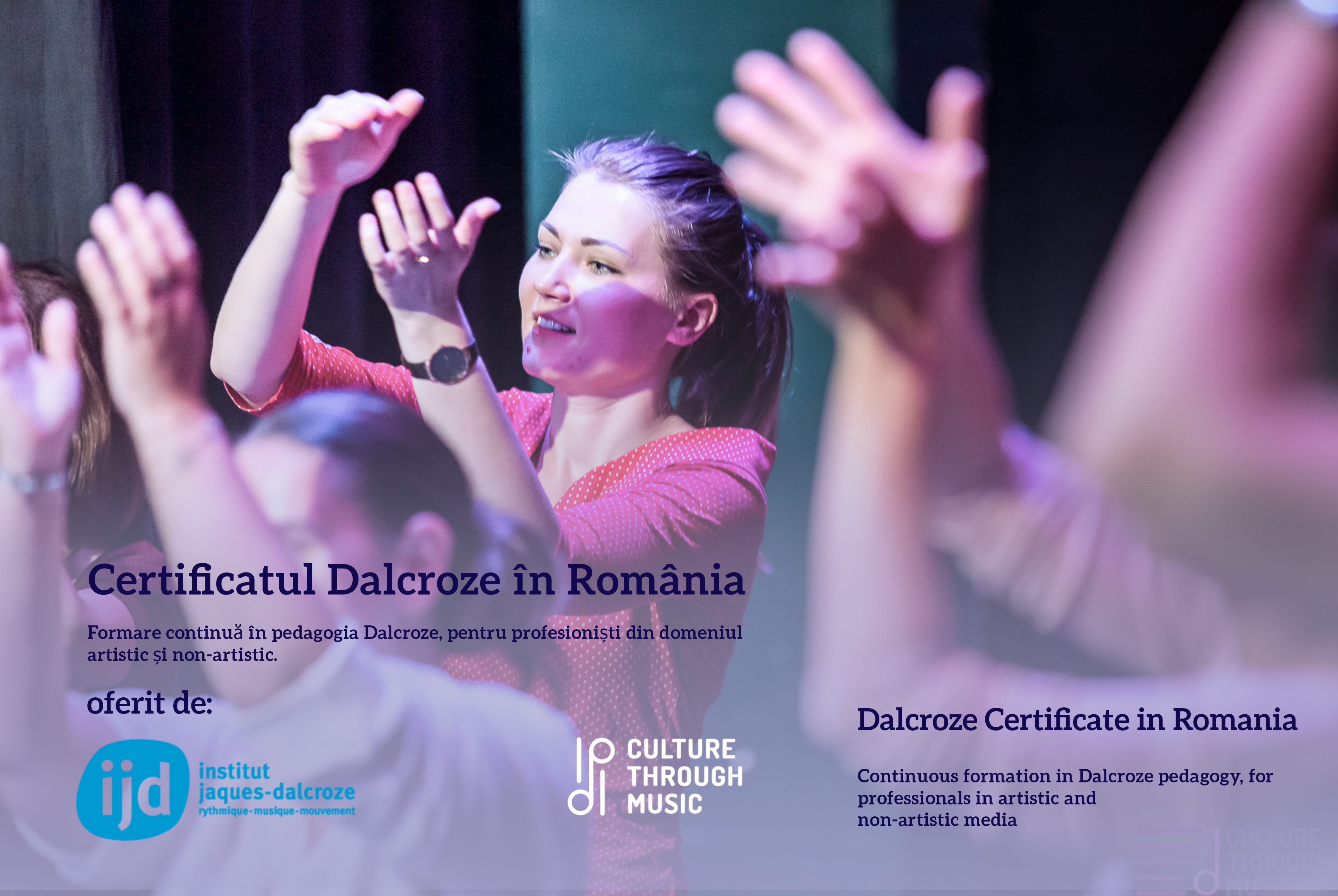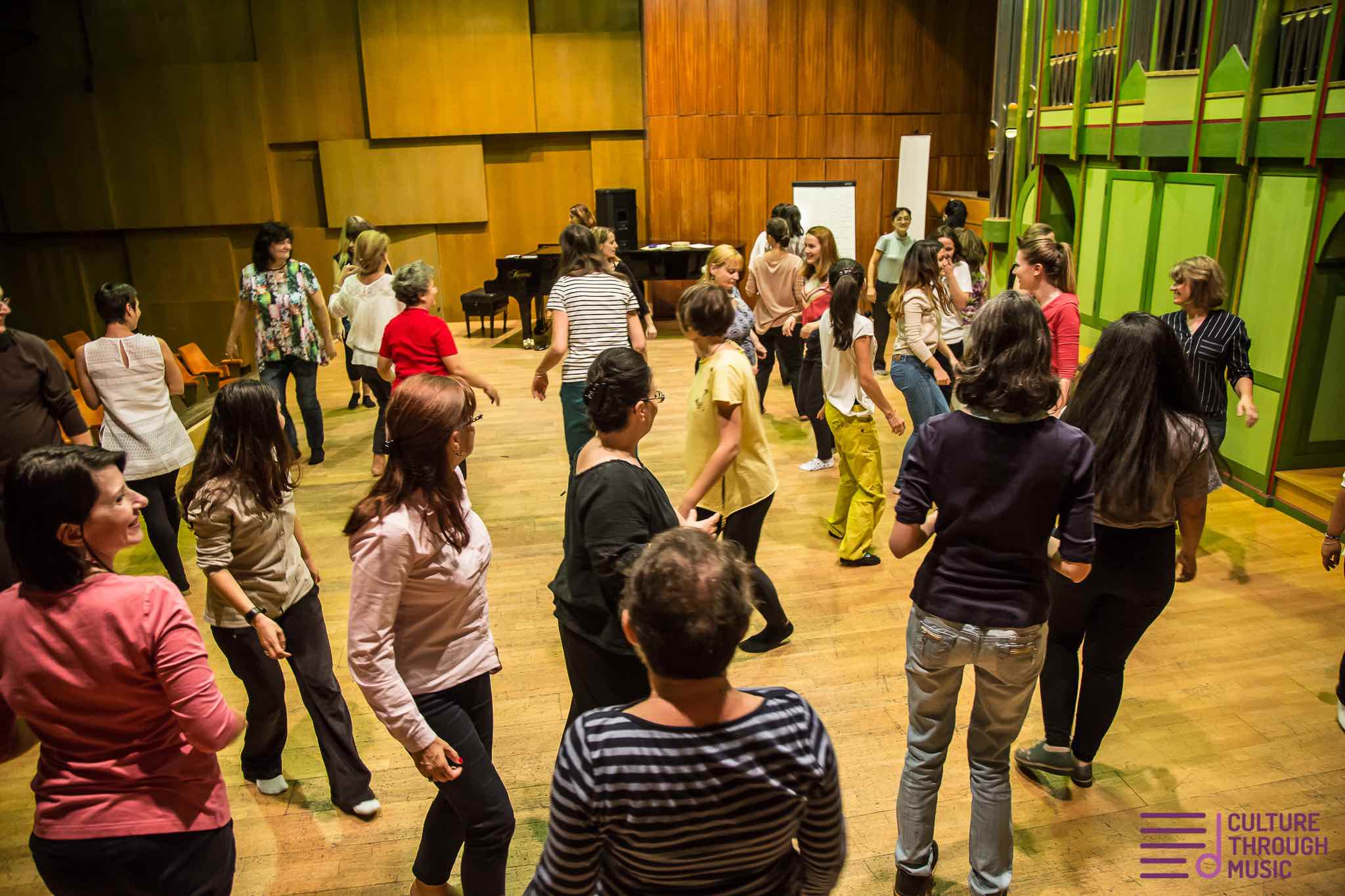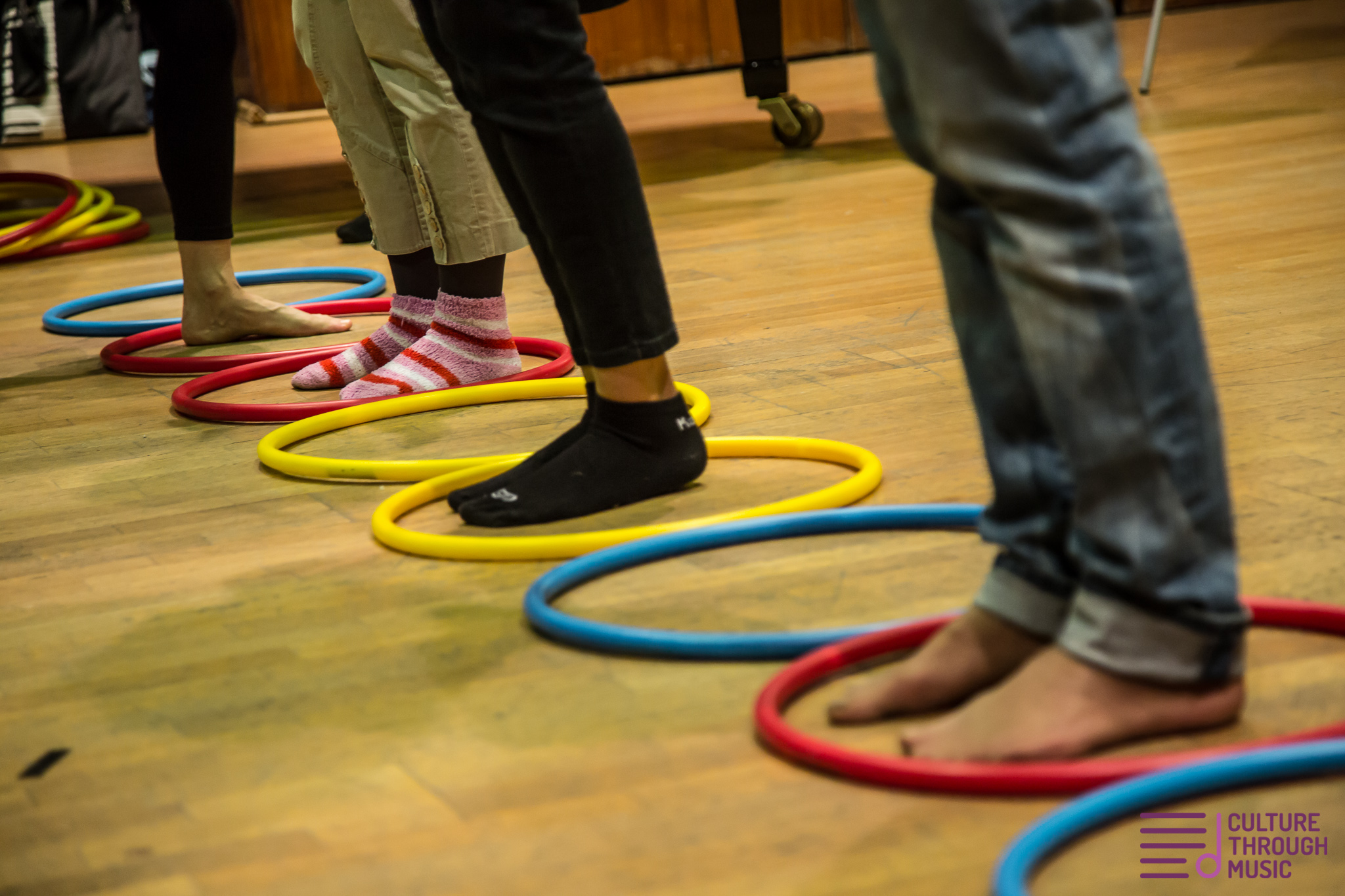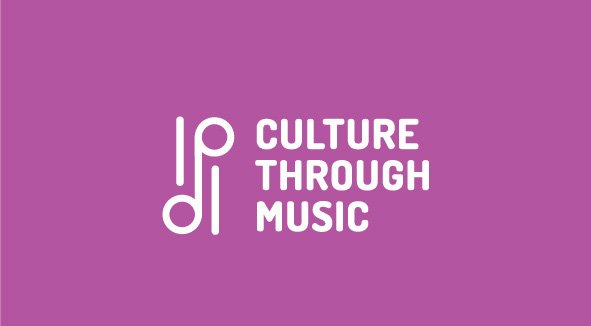What is Dalcroze Certificate in Romania ?
Dalcroze Certificate in Romania (DCR) is a continuous training proposed by the Jaques-Dalcroze Institute in partnership with the Culture through Music Association for those who want to know and deepen the Dalcroze music pedagogy. The DCR Program is presented in detail on its dedicated website: www.dalcroze.ro.
The content of the DCR is articulated around the three basic subjects in the Jaques-Dalcroze pedagogy:
1. RHYTHMIC | Discovering the Jaques-Dalcroze principles in the use of body movement; developing the musicality of body movement, awareness and mastery of gesture, adequacy of musical and bodily energy.
2. SOLMIZATION | Body movement performed in space in relation to music (audition, vocal improvisation, memorisation followed by analysis and restitution); the development of
inner hearing and the sensation of sound space.
3. INSTRUMENTAL IMPROVISATION | Awareness of the expressive power of sound and rhythm through the instrument, voice, sound effects and percussion; practicing improvisation in order to generate bodily and physical responses and to suggest, accompany or transpose movement; improvisation in various languages: tonal, atonal,
modal, etc.
4. SPECIFIC COURSES, INTERVIEWS, SUMMER COURSE, OBSERVATION STAGE | Acquisition and consolidation of individual skills in the field of rhythm, music theory and instrumental improvisation; developing and deepening body expression skills; deepening the Jaques-Dalcroze methodology.
Continuing education ends with obtaining a certificate – the Dalcroze Certificate in Romania – recognized by the Jaques-Dalcroze Institute in Geneva. Obtaining the certificate gives the holder the right to use the principles of Dalcroze pedagogy in his professional practice.
This training does not entitle you to the title of Professor Dalcroze nor to the teaching of the Jaques-Dalcroze method or the Jaques-Dalcroze rhythm or to the teaching of courses entitled “Dalcroze”. The use of the name is protected by law as a trademark.
What Does It Aim to Do?
MAIN OBJECTIVES of CDR are:
- Acquiring methodological and didactic knowledge specific to Jaques-Dalcroze pedagogy in order to adapt and apply them in one’s own professional experience;
- Experiencing the relationship between music and movement;
- Development of instrumental improvisation as a personal practice and as an educational tool.
This training allows learning the basic principles of Jaques-Dalcroze music pedagogy and applying them in the exercise of one’s profession. It is addressed to professionals who want to enrich their methods of teaching musical knowledge through body movement, active listening, live music practice. The specificity of this training offer is
that learning is based on personal practice; promotes global interaction and learning, raising awareness of the role of the senses and emotions in the artistic and pedagogical act.
Who Is It for ?
This training can be attended by a maximum of 25 professionals in the field of music, professionals in the field of dance, acting, educational sciences and therapy.
To be admitted to the CDR, the candidate must hold a bachelor’s degree
(bachelor’s degree or equivalent) in the following units: high schools of music, dance, theater, social work, psychology, educational sciences.
On the existing structure, the courses will be adapted according to the level and requirements of the enrolled participants, by setting up multi-level groups for music theory and improvisation courses. Those who do not work in the field of music must have basic musical notions to be accepted in this training. The Dalcroze certificate in Romania is open to both professionals in Romania and abroad.
Who Teaches the Courses?
The courses will be taught by specialist professors from the Jaques-Dalcroze Institute Geneva, international trainers and holders of the Higher Diploma in Jaques-Dalcroze Pedagogy.
Program Director: Professor Jean-Marc Aeschimann
Further details on pe www.dalcroze.ro
How Is It Organized?
The Dalcroze Certificate in Romania (CDR) amounts to a total of 12 weeks, 12.30 hours per course per student in each week (from Saturday, 9:30 to Sunday, 15:00). The languages of instruction are French and English with consecutive translation.
The program structure retained for CDR 2021-2022 is as follows:
| Course Type | Number of Hours | Period |
| Intensive Course Dalcroze 2021* | 1 Week with 38 hours | 10 – 15 Iulie 2021 |
| Week-end Courses** | 9 we summing up 12.30 course hours per student | September – December 2021 January 2022 – May 2022 |
| Summer Course | 1 week comprising 40 course hours | July 2022 |
| Observation stage*** | 25 hours | To settle |
| Final Exam | Exams, memory, video material | September 2022 |
**Intensive Course Dalcroze 2021 counts for 38 hours during 6 days, following a structure similar with that of a week-end course.
**The structure of a course weekend: Rhythmic (4h30), methodology (1h30), solfeggio (1h30), improvisation (2h), collective improvisation (1h), body movement (2h).
The DCR Program for Week 10 – 15 of July 2021:
|
Hour / Date |
Saturday, 10 July |
Sunday, 11 July |
Monday, 12 July |
Tuesday, 13 July |
Wednesday, 14 July |
Thursday, 15 July |
|
9:00-11:30 |
Rhythmic – global course |
Rhythmic – global course |
Rhythmic – global course |
Rhythmic – global course |
Rhythmic – global course |
Rhythmic – global course |
|
11:45-13:15 |
Musical Improvisation – G 1 and G 2 |
Musical Improvisation – G 1 and G 2 |
Body Movement |
Improvizație muzicală – G 1 and G 2 |
Musical Improvisation – G 1 and G 2 |
Musical Improvisation – G 1 and G 2 |
|
13:15-14:45 |
Musical Improvisation -G 3 |
Musical Improvisation -G 3 |
Individual Study |
Musical Improvisation -G 3 |
Musical Improvisation -G 3 |
Musical Improvisation -G 3 |
|
15:00-16:00 |
Solmization – global course |
Solmization – global course |
Individual Study |
Solmization – global course |
Musical Improvisation and Movement |
Solmization – global course |
|
16:15-18:00 |
Body Movement |
Body Movement |
Individual Study |
Body Movement |
Musical Improvisation and Movement |
Body Movement |
For CDR 2021-2022, the following we with 12.30 course hours were retained:
| Week-end Courses September 2021 – December 2021 | Week-end Courses January 2022 – May 2022 |
|
25-26 September 2021 16-17 October 2021 20-21 November 2021 11-12 December 2021 |
15-16 January 2022 19-20 February 2022 19-20 March 2022 9-10 April 2022 7-8 May 2022 |
***Observation Stage: CDR participants have the obligation to attend 25 hours of application of Dalcroze pedagogy. These classes will be organised in Bucharest in partnership with various institutions: schools, profile schools, institutes, where specialist teachers from CDR will
organise and hold specialised courses.
Participants can also complete these 25 hours of observation at the Jaques-Dalcroze Institute Geneva, but will also incur and bear the costs of transport and accommodation.
A certificate of participation will be requested at the end of the observation week at the Jaques-Dalcroze Institute in Geneva.
Final Exam: September 2022
Support for the final examination shall include:
- exams in the 3 branches: rhythmic, soft, improvisation;
- handing over the final memorandum. The memorandum will be approximately 15 pages long and may be submitted in French or English (standard translations, through machine translation programs, are accepted).
- Submission of the video. A 30-minute video showing how the candidate applies the principles of Dalcroze pedagogy in his own profession.
Where Does It Take Place?
Courses will take place in Bucharest.
How Much Does It Cost?
Subscription tax is 150 RON and is paid once the registration file is submitted.
Participation tax at CDR is EUR 2000. Payment can be made in both euro and RON, the amount paid in RON being calculated at the exchange rate on the day of payment. The amount can be paid in full or in a maximum of 3 equal installments.
Payment is made to the account dedicated to the Dalcroze Certificate in Romania (CDR) program.
Banking information:
Account holder: Asocia ia Cultură prin Muzică
IBAN: RO63INGB0000999911149442
Bank: INGB Centrala
BIC: INGB
The amount is refunded in full in case of withdrawal two weeks before the start of the courses. Otherwise, the amount is due in full.
All funds resulting from fees are dedicated exclusively to covering the costs of CDR and the development of this continuing education program in Romania.
How to Register?
Registration is done by email at office@dalcroze.ro. For registration are
required: a letter of intent, CV with two passport photos, a copy of the diploma (bachelor’s or master’s degree), completion of the registration form and proof of payment of the registration fee. All documents will be sent by mail or deposited at the headquarters of the Culture through Music Association: Povernei Street no. 7, ap. 6,
sector 1, Bucharest.
The registration confirmation is made after analysing the file and making the total payment or the first instalment of the participation fee. Depending on the file, an interview may be proposed before the registration confirmation.
Full details on: www.dalcroze.ro
What Are the Benefits?
- Diploma recognized by Institutul Jaques-Dalcroze Geneva, a world-renowned educational institution;
- Professional improvement by accessing a special pedagogy of active type, with recognised action not only in the musical field, but also in the therapeutic, social and medical field.
- Diversification of teaching-learning methods, addressing, communication by applying the principles of Dalcroze pedagogy. a pedagogy that favours transversal learning and that takes into account the theory of multiple intelligences, offering differentiated solutions for action.
- Personal development by practicing faculties with deep human action, in relation to music: musicality, rhythmic sense, plasticity of movement, physical and mental well-being, imagination and creativity, self-affirmation, ease, balance, relaxation, intellectual and physical agility, concentration, etc.
- Exchange of experience through the possibility of being part of an international community, that of teachers and professionals who apply the principles of Dalcroze pedagogy in their professional practice;
- The possibility to become an active part of a living, involved community, which can produce a positive change, an evolution and a diversification in the place where it acts
- Acquiring a new perspective and new working methods in the professional field.



